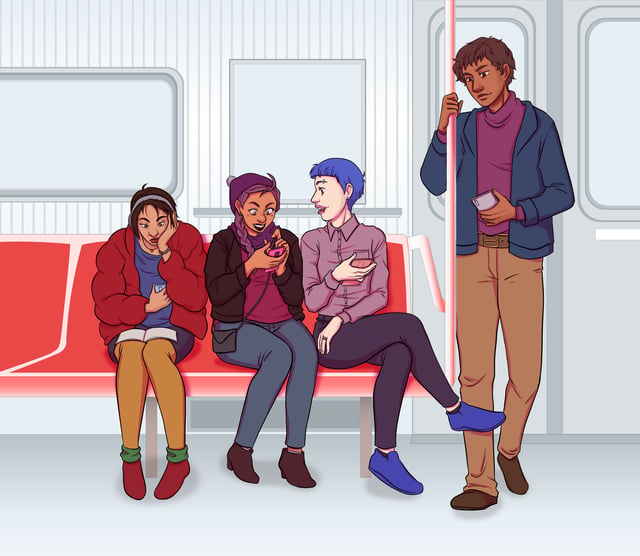This review might become a rant, I apologize in advance.
If I were just looking at the plot of WORTH THE WAIT, I’d probably say it was an okay book. It’s a second chance romance between high school best friends who had unrequited crushes on each other. And 15 years later at a reunion, they see each other, trade some barbs over their falling out, and then sleep together. What comes next includes a misunderstanding, some forgiveness, a little freak-out over one character being closeted, and some will-they-or won’t-they. All of which makes an okay-ish plot, but I am a read-for-characters person. And the thing is that the protagonists in WORTH THE WAIT are okay except for the biphobia, bi erasure, transphobia, and an occasional slur; but they aren’t compelling enough for me to really engage with the book (ignoring the other problems).
Avery is the cohost on an HGTV-type of show, and Merritt owns a vintage hardware store. For reasons that only really make sense in the book, Merritt ends up appearing on the TV show while they are in Portland. This is when they become friendly again, but mainly pine for each other. Avery asks if they might have a secret affair while she’s in town, and Merritt refuses because she doesn’t want to hide. My problem with the relationship is that I am told how much they cared when they were younger, but in the present, they behave like people in lust who used to know each other. The attraction between them never seemed like it would keep them interested unless it was solely built on nostalgia, which it sort of was. Then, there’s barely a hint that they actually like each other beyond thinking the other hot, which makes it really difficult for me to buy into their romance.
And their biggest conflict isn’t that Avery is going to leave after a few weeks, but that she isn’t out and Merritt is. This is probably a personal preference, but I’m not a fan of queer romances that use being closeted as the primary conflict or books where the love interest threatens to, or actually does, out the closeted character. With the latter, a person who threatens to out (or does actually out) their love interest strikes me as a villain; it amounts to complete betrayal and threatening a person’s safety. As regards the conflict of one character in the closet, it almost implies that the only interesting thing about a person’s life is that they are queer, which is incorrect. (This is a good time to remind you that my opinions are not the opinions of this blog. I’m just a tired, middle-aged, angry woman.)
The book outdoes itself and in addition to the but-you’re-closeted conflict, Merritt threatens to out Avery (she acknowledges that she never would, but it seems like a genuine threat to Avery at the time). The book relies on a fear that the world wouldn’t accept Avery if she’s gay to maintain some momentum and strain for their relationship.
Then, there are the series of microaggressions towards non-lesbian queer women that the book basks in. Almost from the start, the book settles into the idea that there are straight women and lesbians. Reading this book as neither of those categories amounts to subjecting yourself to pinpricks and tiny cuts that leave you wondering why you feel uncomfortable and uneasy. Avery reflects on Merritt in high school with:
“Merritt had always made the Vale girls nervous, and even the straight girls had looked at her at least once and thought, Maybe.”
And when Merritt is reflecting on her attraction to Avery (prior to knowing that Avery is a lesbian), the binary of lesbian or straight exists too:
“Avery touched Merritt’s arm the way she had when they were kids, a gentle pat that lingered a moment too long, the kind of gesture that lesbians had to remember meant nothing when coming from straight girls.”
The one time there is a reference to bi women, it comes with the idea that they are dangerous for closeted Avery: she refuses to sleep with bi women because they don’t have as much to lose as she does. Now we return to the reason they fell out as girls. When they were 18, Avery and Merritt were meant to go to prom together as friends, except Avery stood up Merritt and went to prom with her future TV cohost, Alistair, essentially mimicking the great bisexual threat of “she will leave you for a man.” So, in a way, the entire book is based on a very flimsy biphobic platform.
And speaking of phobias, the book has a miserable scene with Avery’s rock star friend DX where not only do we see that DX is not a good person, she uses an offensive term for an intersex person and possibly displays some transphobia:
“‘I know this performance artist in Milan,’ DX said, “who will have sex with you in a hammock strung between two cathedral towers. And he’s a hermaphrodite, so, best of both worlds.’”
I said it in a review for another book, but there is really no reason for this. An author owes it to her readers to not use an offensive word or slur.* And to add to the insult, Merritt then uses the term, and no one interrogates how wrong it is. Even worse, none of it serves a purpose except the make DX seem edgy, when she’s really horrible.
Here’s my confession: I tried to read the first book in this series and I couldn’t finish it. I made it maybe 25% before the weird microaggressions got to me. With WORTH THE WAIT, I did read 65% and skimmed the remaining 35%; however, as I complained to friends, they asked me to stop reading. Perhaps they were tired, but likely they could see my sanity fraying.
This review is already too long, but I need to comment some more on the friends in the book. Alistair is asexual for convenient plot reasons and I can’t tell if he’s written inconsistently or not, but in one scene, he’ll care about Avery’s happiness and then the next make her feel guilty for wanting to be out and with Merritt. DX is outrageous and wealthy for one bit of plot, but otherwise insufferable. Lei-Ling is over-the-top cutesy and naive, and I’m a tiny bit afraid that she might be a caricature, but I was so sensitive to this book that it could be me seeing issues where there isn’t one. And Iliana was fine, sort of flat, but nothing to complain about.
Overall, it’s clear that WORTH THE WAIT is written for a lesbian audience. As a queer woman who is not a lesbian, there are enough jabs at bisexual, pansexual, and questioning women that at best this book will feel like a pebble in your shoe; and at worst...I really don’t know. This book felt like tiny pinpricks and papercuts for me; one, I can manage, but a steady stream makes me wonder why I bother.
*I will block you if you mention “hermaphrodite” as a biological term because it’s not the time or place for that pedantry.
Content warnings: biphobia, bi erasure, transphobia, offensive terminology, closeted character


